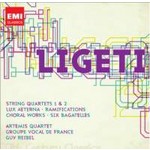
MARBECKS COLLECTABLE: Ligeti - String Quartets 1 & 2 / Vocal works
 $30.00
Out of Stock
$30.00
Out of Stockadd to cart
GYORGY LIGETI
MARBECKS COLLECTABLE: Ligeti - String Quartets 1 & 2 / Vocal works
Artemis Quartet / Barry Tuckwell Wind Quintet / Groupe Vocal de France, Guy Reibel
[ EMI 20th Century Classics / 2 CD ]
Release Date: Sunday 1 August 2010
This item is currently unavailable via the quick and easy sources, but we’ll make enquiries for you. Please note - listed price is indicative only.
Lux Aeterna put Ligeti on the map for the wider public when Stanley Kubrick appropriated it for its unearthly effect in his film 2001, A Space Odyssey. But his music began firmly in his Hungarian roots, and bears a debt to Bartók and Kodály. Both sides of this modern master are heard here.
The Hungarian composer György Ligeti (1923-2006) was born in Romania of Hungarian Jewish parents. As a Jew living in mid-20th-century central-Europe, Ligeti's early musical training was interrupted by World War II. He was detained in a Nazi labour camp while other members of his family were sent to Auschwitz: only he and his mother survived the War. At the cessation of hostilities Ligeti continued his studies in Budapest until 1956, when the Soviets repressed the Hungarian revolution. He fled to Vienna and, some years later, became an Austrian citizen. Now in the West, Ligeti was free to develop and meet the leading composers in European avant-garde music of the time. Figures like Karlheinz Stockhausen, Gottfried Koenig and Herbert Eimert encouraged him to join them at the electronic music studio of Westdeutscher Rundfunk in Cologne. It was the première of his Apparitions in 1960 that launched his international career. The first disc in this set comprises the two string quartets from 1953/54 and 1968 respectively; Ramifications from 1968/69 and the Six Bagatelles from 1953 (these last two recordings are new to CD). The second disc contains a selection of Ligeti's vocal works. Ligeti died in June of 2006 in Vienna and was buried there. He is, perhaps, best known for the various pieces of his music that Stanley Kubrick used in several of his films, notably 2001: A Space Odyssey, The Shining, and Eyes Wide Shut
Tracks:
String Quartet No. 1 'Métamorphoses nocturnes'
String Quartet No. 2
(Artemis Quartet)
Six Bagatelles for wind quintet
Lux aeterna
Three Fantasies after Friedrich Hölderlin
Hungarian Studies
Three Hungarian Folksongs
Mátraszentimrei dalok (Songs from the Mátraszentimre region)
Ramifications


![Khachaturian (incls Violin Concerto & Spartacus [excerpts]) cover](https://images.marbecks.co.nz/_thumbnails/10177/10177016.jpg)
